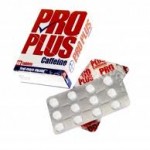Caffeine pills (usually found as caffeine citrate) are over-the-counter or prescription drugs classified as central nervous system (CNS) stimulants. The pharmaceutical information website Rxlist.com states that caffeine is “an odorless white crystalline powder or granule, with a bitter taste.” Caffeine occurs naturally and is found in common products like coffee, tea, soda, kola nuts and guarana berries.
 Caffeine pills are often used for weight loss, and as a pick-me-up later in the day. The average caffeine pill contains 200mg of caffeine, equivalent to two cups of strong coffee. They are not inherently dangerous but do require caution.
Caffeine pills are often used for weight loss, and as a pick-me-up later in the day. The average caffeine pill contains 200mg of caffeine, equivalent to two cups of strong coffee. They are not inherently dangerous but do require caution.
Function
Drugs.com reports that caffeine pills are indicated for use in treating a number of medical conditions. Certain medications combine caffeine with ergotamine, aspirin or acetaminophen, and these pills can be used to treat migraine and cluster headaches and headaches that occur after surgery. According to the National Headache Foundation, migraines occur when blood vessels in and around the brain enlarge. Caffeine alleviates headaches by causing these blood vessels to constrict.
Caffeine appears in a number of antihistamine and cold medicines to help patients who suffer from the drowsiness these medications can cause. Rxlist.com reports that caffeine has also shown success in treating dizziness and postponing the onset of Parkinson’s disease in the elderly, as well as treating asthma and preventing the formation of gallstones.
Instructions
Things You’ll Need
- Caffeine Pills
- Calcium Supplement
- The most important thing you can do when you want to start taking caffeine pills is consult your doctor. There are many brands out there, some of which have adverse effects on  people with certain medical conditions. Always get a consultation with your physician before you begin taking any kind of over-the-counter supplement.
- Check out the labels of the caffeine bottles in your grocery store’s vitamin section. The best pills to begin taking, and certainly the safest, have 200mg or less of Guarana Seed Extract. Guarana is a natural source of caffeine, often used in     caffeine pills and certain weight loss supplements.
- Use caffeine pills sparingly.
- Caffeine intoxication is recognized by a state of central nervous system over-stimulation. This can be actually lead to death, and many people have been hospitalized because of caffeine intoxication.
- Drink eight glasses of water a day. Caffeine has a diuretic effect.
- Caffeine can have negative effects on the stomach as well, including peptic ulcers, erosive esophagitis and acid reflux.
- Take caffeine pills early in the day. Although many people live hectic lives, even away from work, the effects of the pills take several hours to wear off. Using them after 4 p.m. will make it hard for you to sleep. The sleep disorder is     characterized by disturbances in sleep and nightmares. The anxiety disorder is characterized by panic attacks, obsessive-compulsive behavior, and can even mimic bipolar disorder and schizophrenia.
- Take extra calcium if you use caffeine pills more than once a week. Caffeine causes the body to underutilize available calcium.
- Start  taking half the recommended dosage on the bottle of caffeine pills. You’ll want to gauge your body’s reaction to the pills before taking the full amount recommended. Check your pulse while on caffeine pills. It should be less than 86 beats per minute. If your pulse is 90 or greater, don’t use them again.
- Taper caffeine pills slowly to avoid withdrawal effects, such as headaches and irritability.
- Know that substituting caffeine pills for a good night’s rest is a bad idea. There is no substitute for a good night’s sleep. You may have a false sense of wakefulness, only to find yourself asleep at the wheel moments later.
 Tips & Warnings
Tips & Warnings
- Caffeine is a major ingredient in many over-the-counter analgesics containing aspirin and phenacetin. If you’re sensitive to caffeine or are trying to quit taking it, read the labels of your analgesics.
- One of the larger caffeine pill manufacturers is the pharmaceutical company SmithKline Beechum. If you have more questions about caffeine pills, call the company on a weekday at (800) 245-1040.
- Avoid using caffeine pills if you are pregnant or suspect you might be. Caffeine increases the risk of a miscarriage.
- If you are taking anti-coagulants or MAO inhibitors, check with your doctor before taking caffeine pills. Don’t take them if you’re under 18, if you have any history of seizures (even those caused by fever when you were a child), or if you have blood pressure or heart problems.
- If you have any questions or concerns, contact a physician or other health care professional before engaging in any activity related to health and diet. This information is not intended as a substitute for professional medical advice or treatment.
